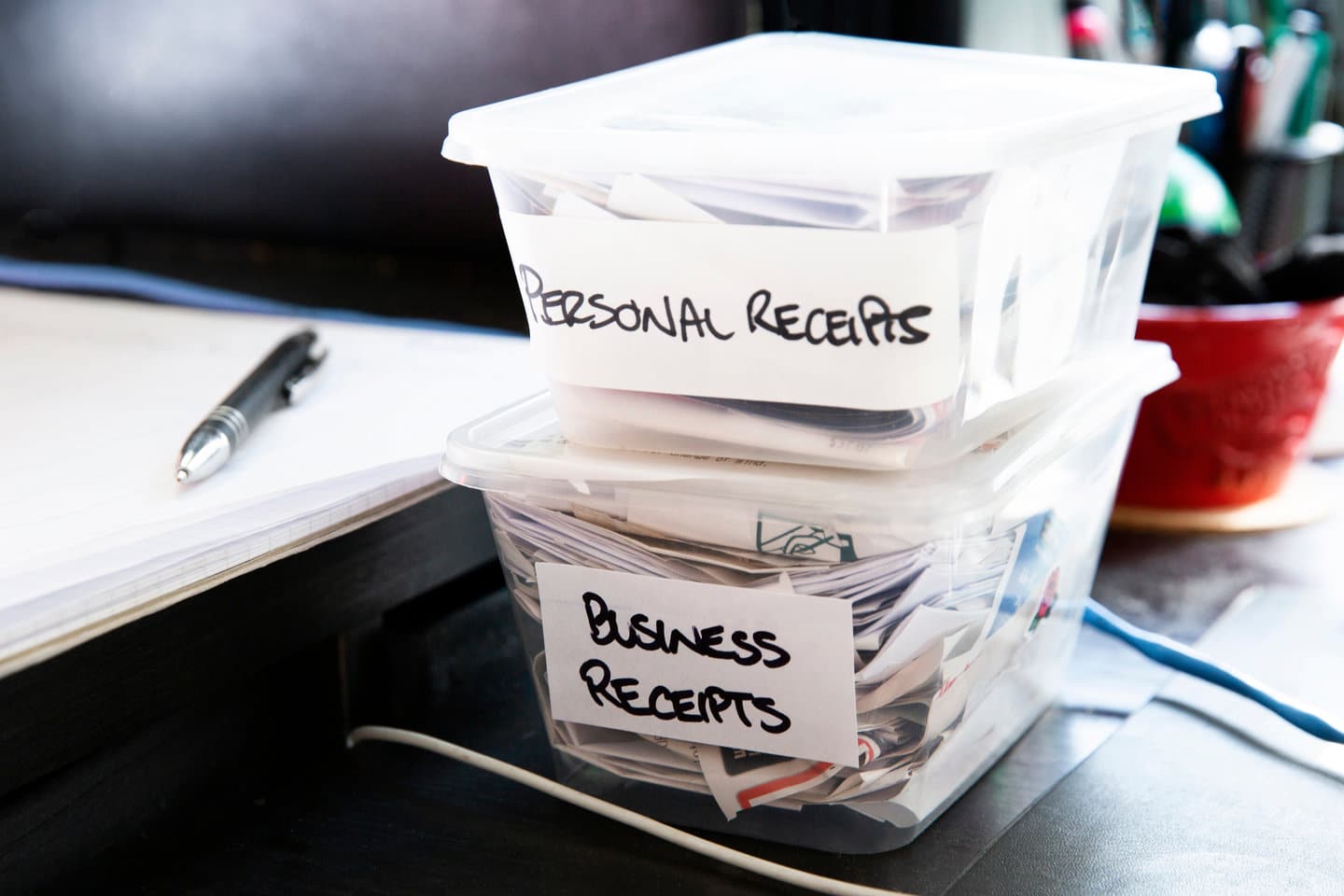Jasmine Birtles
Your money-making expert. Financial journalist, TV and radio personality.

Freelancers often operate on a shoestring budget – especially when they’re first starting out. It doesn’t matter if you’ve just started your new freelance career, or you’re already years into it: there are always new ways for you to save money.
From remembering what you can write off on your taxes to using free trials to your advantage, there are lots of ways freelancers can save money.

Did you know that freelancers can claim some home expenses on their annual tax return? This means you’ll pay less tax at the end of the financial year.
You can either work out a proportionate rate or choose the flat rate supplied by HMRC. The proportionate rate is how much you use for business.
For example, if you have a spare room that’s your office, and you have six rooms in your home in total, you can claim 1/6th of your monthly rent or mortgage payments as a business expense. The same goes for water, electricity, and gas bills, too.
For your home broadband, you could claim a proportion or have a separate business broadband contract.
There are lots of other ways freelancers can save money when you’re working at home, such as:
Make the most of your flexible time! Take a few hours to batch cook each week. Make meals and freeze portions so that you’ve got healthy, cheap food at hand all the time. This saves a lot of money in the long run, and it also saves you time overall each week. By batch cooking, you can also buy ingredients in bulk to save money, too.
Turning your thermostat down by just one or two degrees can save significant chunks of cash each year. You won’t freeze! Layer up instead, with a jumper, socks, and even a blanket.
Shop around for your gas and electricity suppliers to make sure you’re getting the best deal. Switching with Energy Helpline could save you around £460 a year! Slashing your tariff cost is particularly important when you’re spending most of your time at home when, previously, you may have been out at an office or workplace.
We’ve got loads more tips about saving money while working at home here.
It’s easy to start blending the work/home expenses when your office is your spare room/kitchen table/sofa. Making a budget for your personal spending, and another for your business costs, will help you control your outgoings.
Budgets give you a good idea of the minimum income you need to make each month to cover both business costs (such as website costs, marketing, and equipment) and personal (like rent, utilities, and food). It also helps you see where you can cut costs to save.
For example, if you’re spending a lot on your broadband contract, use a broadband comparison website such as broadband.co.uk to look at switching to save money.
When you’re working out your budget, remember that freelancers need to set aside around 30% from each paid invoice to cover their tax bill. So, you need to ADD 30% to your monthly budget just for taxes and National Insurance!
When you’re starting out, you might not pay taxes for the first year or two. Your setup costs will be high, and you might not get a steady income until you’re more established. However, the habit of setting aside 30% of every payment helps you build an emergency buffer for the slow times, too.
This 30% is another way to make money, as well. Find the highest rate savings account and pay into that. Interest rates are rubbish right now, but as it’s for your tax bill you can lock your money away until January each year. This means you can access higher-rate fixed term savings accounts for a better return.

Once you’ve got your budget in place, it’s essential to keep track of your spending. Some months, it’s inevitable you’ll spend more than others. So, try to keep a three-month view of your budget management when it comes to business expenses.
For example, setting up your business involves website hosting and development, marketing costs, and new insurance. This makes for a capital-heavy month – but your following months won’t be as expensive.
Use an app like Expensify to take photos of your receipts. You can tag each receipt into a category, such as travel or business expenses, to make it easy to file taxes. In addition, it helps keep an electronic copy of all receipts – which is ideal in case HMRC decide to audit you.
One of the biggest perks of being a freelancer is flexible time. You can work the hours you want! Sometimes, you’ll need to work on-site at set client hours – but even then, you can agree those hours.
So, it means you can do everything off peak. Simple things like the grocery shop become much easier and less stressful when you can visit at quieter times. This’ll help you save on your food bill, as you can take time to consider offers rather than feel rushed.
Choose off-peak options wherever you can. If you need to travel, for example, book your ticket in advance AND make it an off peak time to save serious cash! Those with a gym membership will benefit from finding out if your gym offers an off-peak membership to save potentially hundreds of pounds each year.
Night owls do very well with off-peak deals! Energy tariffs, for example, can be much cheaper between midnight and 7am. If you prefer working in the dead of night, you could save serious amounts on your utilities bills.
Business software, website hosting, even Amazon Prime: make the most of free trials! Lots of companies offer a week, 2-week, or 30-day trial for their product. Every savvy freelancer knows to use these free trials before paying a penny for anything.
For example, when you’re first setting up your freelance business, an Amazon Prime trial means you can get your essential equipment delivered next day – without any extra cost. Trialling software, too, means you can test it out before committing to the expense.

Once you’ve settled on certain services and software, use your referral code to get further discounts!
For example, web hosting services often offer a free month if a friend also signs up using your unique code. Do this for other things that aren’t necessarily business-related, too! Some energy companies, for example, offer a refer-a-friend credit that benefits both you AND your friend.
Wherever possible, for recurring expenses, try to pay annually instead of monthly. When you’re starting out, this isn’t always possible if you’re on a tight budget. However, annual payments can save you hundreds of pounds in total over the course of the year.
For example, software annual payments are typically £100 or more less if you pay up-front for a year. Business insurance, too, will offer a lower premium for annual payments, as will car insurance.
To keep ahead of annual payments, set aside a monthly equivalent into a savings account. For example, if your design software costs £500 a year, put aside £42 a month. Then, when it’s time to renew, you won’t have a shock of a large expense.
First thing: you MUST get a separate account when you go freelance! Even if it’s a basic current account with no bells and whistles. Make sure your invoices get paid into that account, and then transfer a proportion to your personal account as salary.
It’s also worth setting up a separate savings account. Most allow you to set up ‘savings pots’ within the account, too. So, you can save into one ‘pot’ your 30% for tax and National Insurance, another for annual expenses, and one more for emergency business expenses.
Banks often offer great deals to switch account – most recently, Natwest ran a £175 switching bonus! Business bank accounts don’t often offer switching deals – but it could be easier to get a business account if you’re an existing customer of the bank.
So, switch your personal current account to take advantage of the deal. Next, set up either a second current account or a business account – it’s much easier to do if you’re already with the bank.
If you’re happy with your personal account, shop around for business accounts. Some are free to have but charge for transactions, while others have a monthly fee. Remember that you can offset all bank charges on your tax return.
Sole trader freelancers don’t have to have a business bank account – but it can offer more benefits than a personal account.
Startup business bank accounts have some great offers. They might include first-year business insurance, for example, or a year of free banking. Some also include free access to HMRC-approved digital accounting software like FreeAgent, too – so you can save a LOT of money in your first year.
A business bank account means you can also access business loans and credit cards. Some banks require you to become a Limited Company before you can have a business account, while others accept sole traders.

Some freelancers don’t need much to set up: a computer, a desk, chair, and internet connection are the basics to get going. Others, however, may also need more equipment before business opens.
For example, a private dining chef will need to invest in catering equipment. Instead of buying new, look for second-hand equipment to get started. If you find you use the item a lot, then when you’ve got a better cashflow you can invest in a new version.
Even computers, smartphones, and tablets don’t have to be brand new. Opt for refurbished products to save money. These are second-hand items that have been checked that they work as they should. Refurbished items come with a guarantee, too, which second-hand things from Ebay or Gumtree won’t.
If you REALLY need a new upgrade, look at your existing tech. There’s often many ways to recycle or sell your old tech for cash to help fund your new purchase. Some manufacturers or retailers offer a direct discount scheme too, if you hand over your old tech at the time of purchasing a new item.
When you know you can write off the expense of a new work phone off your tax bill, it’s tempting to go for the newest, flashiest model. However, you’re unlikely to need it to start with!
A brand-new smartphone model often costs upwards of £50 a month. Models that are still useful, but a year or two old, cost half that. If you’ve got a perfectly good phone already, perhaps you just need a SIM Only deal! (This works particularly well if your existing phone takes dual SIMs, so you can have your personal and work contacts on one phone).
For example, at the time of writing, a Samsung S20 costs £58 a month for unlimited data, texts, and minutes. You could get a SIM Only deal for the same plan on the same network for only £28 a month. Over a 24-month contract, that’s saving a whopping £720!
When you’re starting out on a budget, look for others in your position, too. They can help you set up your business without it costing you a penny!
Skills swaps are a valuable way to get your freelance business up and running on a budget. It’s also a great route to building your freelance network – an invaluable tool for finding clients. There’s a common misconception that all freelancers are competitive with each other. In fact, they’re mostly very supportive of each other! That’s because many have niche skills – so sometimes a client won’t fit their skills, or they need extra support. They’ll reach out to their freelance network to subcontract the work.
Swap skills with those in your industry or who could become a valuable contact. For example, if you’re a freelance writer, offer to help a graphic designer with their website copy in return for a logo design. These two skills, alongside web development and design, and marketing, often tie in together for client projects. Build this network to find clients AND save each other money with your mutual skills swap!

Some freelancers need to work on-site with clients. Others don’t need to be face-to-face at all!
Even if you need to visit clients now and then, make the most of the recent working-from-home revolution. People are now far more used to Zoom calls, Google Docs, and project planning software like Trello to keep on top of group tasks.
Using the free software available to you means much of your work can be done remotely. This significantly reduces the amount of time (and money) you need to spend travelling to see clients. It also means you’re not spending on things like that ‘quick coffee’ you pick up at the station or on the way back from a meeting.
Hiring an expert to handle your business finances might seem like an expense you can’t afford. In fact, they could manage to SAVE you hundreds or even thousands of pounds each year!
Use an accountant to manage your annual tax return, at least. They’ll go through your expenses and income, and reconcile the two to make sure your accounts are balanced. This can save you hours and hours of work that you could otherwise spend on paid work. They also have a keen eye that’ll spot where you can write expenses off your tax bill, which saves a LOT of money over time.
In addition, you can put their fees against your taxes, too, so it’s worth paying for the expert knowledge!
Don’t wait until the January 31st deadline to rush your tax return in. You can submit the previous year’s return any time online after April 6th. You don’t, however, have to pay your tax bill when you submit.
The final bill is paid in January. However, submitting your tax return in April means you’ll know EXACTLY how much tax you need to pay by the following January. This helps you budget – and means you could have spare cash left over in your savings. Either save this for Payments on Account in July, or use it to invest in something you’ve been waiting to have spare capital to buy. (If you’re savvy about this, you can use that investment to write off some tax in your next return, too!).
Make the most of automation to save time on administrative tasks. Chasing late invoices, for example, takes repeated hours of emails and calls. Using an invoice app, available with almost every type of accounting software, automates this process for you. It’ll send reminders for payment at set targets, to keep the pressure on late payers without the need for your time.
Tying your accounting software into your bank account activity also means you’ll spend a LOT less time managing your books. It’s easy to categorise expenses and income, making it simple to complete your accounts management and tax returns.
You can also consider setting up passive income streams. These involve a little bit of initial work, but then you can ‘set and forget’. For example, you can create ebooks or online courses for people to download or watch in their own time. Once the content is there, you don’t have to do anything else. These can generate passive income for years to come!

Cashback sites aren’t just for personal spending! Sites like Quidco and Topcashback have sections just for businesses. For example, you can order office stationery, paper, and even software or insurance through these sites.
Going through these sites means you can earn a bit back on each spend. It’s counted as a refund, not income, for tax purposes. It puts a bit back into your pocket and keeps costs down overall throughout the year.
Remember, too, that these sites offer ‘refer-a-friend’ deals as we mentioned earlier!
It’s always better to spend within your means rather than taking out credit. However, it’s not often possible – especially for new freelancers with setup costs. Look at a cashback credit card to put your business expenses on!
You’ll earn cashback on your spending and it’ll keep your expenses separate from your personal spending. Also, spending on a credit card offers additional consumer protection for purchases over £100, such as computer equipment.
Freelancers MUST set up their professional insurance as a priority. You might think you don’t need one – but it’s absolutely essential. Public liability insurance is vital if you’re allowing members of the public to visit your premises, for example.
Every freelancer needs professional indemnity insurance, too. This protects you if someone says your work caused them a loss of income or a lawsuit. For example, let’s say you wrote an article for a company. If they post the article online, and someone sues them for libel because of the content, the client could then sue you. Professional indemnity insurance covers the costs involved in such a case.
(As a side note, if this is your situation, make sure your freelance contract stipulates you’re not responsible for the final publication of content. This protects you further from such claims).
You should also consider contents or equipment insurance, too. Even if you’re working from home, your current home insurance may not cover equipment specifically used in the line of your business.
Use an insurance comparison tool to shop around for the best deals available.
Going it alone as a freelancer is a scary time for anyone. You’re not alone! There’s a boom in the number of freelancers lately – and it’s set to increase in the future, too. One of the best things you can do is meet other contractors to build your network and share your experiences.
Hop over to our Magpie Messageboards to get in touch with like-minded freelancers, contractors, entrepreneurs and business owners!
Need more help with your freelancing plans? Check these out!

An informative and extensive article. Thanks.